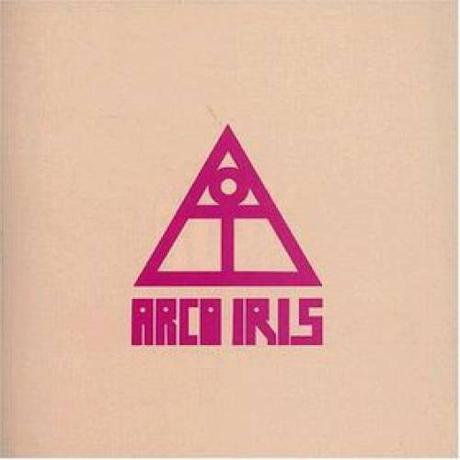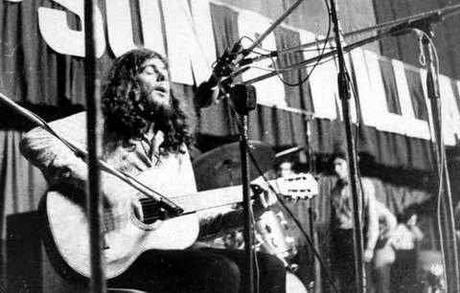
Gracias a nuestro amigo Desjer, seguimos trayendo discos del recuerdo, clásicos y no tan clásicos del primogéneo rock nacional pero desde nuestra faceta más cercana a eso que se da comunmente a conocer como "prog rock". Y aquí están los que fueron los reyes del folk prog en Argentina, con todo su misticismo, su onda particular que ya desde aquí se podía intuir claramente. Aquí, el puntapié inicial de la larga historia musical de Santaolalla, que junto a Bodarampe, el gran Ara Tokatlian y Gianello dan comienzo a un verdadero mito que se llamó Arco Iris. Y en lo que queda de esta semana los vamos a estar recordando en este humilde espacio.
Artista: Arco Iris
Álbum: Arco Iris
Año: 1970
Género: Folk Rock
Duración: 67:46
Nacionalidad: Argentina
Fue el primer disco de grupo, así que trae toda una oleada de misticismo, más de lo que puede traer cualquier disco de esta banda... Además del disco en sí, hay 8 bonus tracks para que puedan disfrutar al máximo. Otra obra fundamental de esta magnífica banda.
Arco Iris fue una banda de rock argentino formada en 1968 en la localidad de El Palomar en el Gran Buenos Aires, integrada por Gustavo Santaolalla (guitarra y voz), el egipcio Ara Tokatlian (vientos), Guillermo Bordarampé (bajo), Horacio Gianello (batería y percusión), y Danais Winnycka (Dana) (guía espiritual). Es considerado uno de los grupos fundacionales del rock argentino, aportando un misticismo y sobre todo la idea de fusión del rock con ritmos folklóricos que contrastaba con otros referentes de la época, como Los Gatos, Almendra, Manal o Vox Dei.Wikipedia
(...) Su primer disco fue el simple Lo veo en tus ojos y Canción para una mujer, publicado el 6 de mayo de 1969. En enero de 1970 ganaron el Festival Beat de la Canción Internacional de Mar del Plata con el tema Blues de Dana, que se transformó en un éxito. Pocos meses después editan una recopilación de sus singles bajo el título de Blues de Dana, y en mayo del mismo año editan su primer álbum oficial, Arco Iris.

Inmerso en la férrea disciplina que se imponía en la comunidad orientada por Dana, Santaolalla compone los temas de este primer disco. Arco Iris todavía esta lejos de sus mejores álbumes, sin embargo se vislumbran los elementos que posteriormente desarrollarán: folk, blues, rock, jazz, con canciones pop y un recurrente aire pastoral. Y consideremos que, cuando el disco se empezó a grabar, ¡Santaolalla tenía sólo 17 años!
Más allá de que este primer disco, como el primero de Almendra, está grabado en MONO por técnicos poco acostumbrados a grabar rock. Cuando salió, a mediados de 1970, impactó muchísimo en el reducido público de rock progresivo.
En la misma época que apareció Blues de Dana, compilando los primeros temas de Arco Iris llegaría también su álbum debut, el homónimo Arco Iris, en el que podemos disfrutar de los primeros pasos de Gustavo Santaolalla y su grupo.Persy
Arco Iris es un LP bastante irregular, tanto en su estilo como en el nivel de sus composiciones. Por un lado tenemos aquellas canciones como “Quiero llegar”, segmentada en distintos tramos en los que llegan a rockear y desparramar psicodelia en especial en sus tramos instrumentales. Dentro de la misma onda encontramos a la genial “Camino”, con Ara Tokatlián imprimiendo su huella con su flauta, además de “Tiempo” con su saxo marcando un ritmo jazzero muy original. También tenemos a “Y ahora soy”, de la misma onda incluso siendo la más larga (casi 12 minutos de duración), siendo la única que se repite en Blues de Dana.
Pero por otro lado el disco abunda en sonatas como “Hoy te Mire”, “Coral” y “Te quiero, te espero” en las que se destacan principalmente la voz de Santaolalla, pero con melodías lentas que aburren un poco, aunque sin llegar a ser malas.
En definitiva, Arco Iris termina siendo un trabajo bastante valorable, que nos muestra las dos caras de esta banda, apareciendo lo más disfrutable cuando Arco Iris desprendeel rock de sus venas.
Arco Iris was already much more than a rock band. With the spiritual guidance of the Ukrainian model Danais Winnycka (Dana), formed a community in El Palomar, in the west of Buenos Aires, which was governed by strict rules naturists: was banned the consumption of meat, alcohol, drugs and also sex.Lucasc
The group was characterized both by its hippie mysticism, under the guidance of Dana as a musicality characterized by complexity and fusion with folk rhythms, from the hand of talent as a composer Gustavo Santaolalla and Egyptian Ara Tokatlián, providing sound flute or saxophone, unusual in Argentine rock then.
Gustavo Alfredo Santaolalla, together with church fellows Tokatlian and Bordarampé, formed several bands in the 60s (The Rovers, The Blackbyrds, The Crows) to play covers and, later on, his own songs.Disco Eterno
After recording a 3-song demo tape, they met producer Ricardo Kleinman (owner of the successful radio show Modart en la Noche) who agreed to sign them with the condition that they sing in Spanish... and change their name!
Arco Iris recorded two late-60s pop tunes: "Lo veo en tus ojos" and "Canción para una mujer" (no relation with the Vox Dei song with the same name) with orchestral arrangements by Rodolfo Alchourrón (another Kleinman demand –note the great similarities with the first Almendra single!). The b-side is one of my personal favourites.
Months later, Arco Iris released a second disappointing single and met former model Danais Wynnycka (a.k.a. Dana) who became their "spiritual guide" and began to live communally with her.
Their next single, "Blues de Dana" (obviously dedicated to the beautiful lady) reflected changes in the music as well. This 5-minute guitar blues won the Mar del Plata Beat Festival.
By the end of 1969, Arco Iris began recording sessions for their first LP, to be released in May 1970. The pink cover showed a triangular logotype that represents the philosophy of the group. The album includes some very beautiful songs penned by Santaolalla in a vocal pop-folk style with both acoustic and electric instruments. Among them "Hoy te miré", "Te quiero, te espero", "Canción de cuna para un niño astronauta", "Tiempo", and the lengthy "Y ahora soy". The latter sort of previewed the instrumental development of future releases.
Alberto Cascino quit, uneasy with the "commune life" (this is the reason why he is not on the album cover). Several drummers replaced him until "Droopy" Gianello took the job.
This self title album represents the most spiritual, "pop" folk side of the band and the less jazzy one. This first effort is characterised by the typical "beat" sound of the 60's. Consequently it's more in the vein of proto-prog bands as Vanilla Fudge and others but with a nice emphasis on acoustic parts. "Quiero Llegar" starts as a calm, "enchanting" song then goes into a rock 'n roll "trip", featuring some beautiful electric guitar solos. "Hoy Te Mire" is one of these mellow, mainstream acoustic ballads, including Spanish lyrics about love and desire. "Camino" is a "sunny", pastoral, romantic ballad with some "naive" pop accents. "Coral" is an emotional and "nostalgic" polyphonic chant with nice dialogues between the voices. "Te Quiero, Te Espero" is an other love ballad, probably the most achieved on this album, very "sensitive" with a memorable, "dreamy" acoustic instrumentation. "Luli" is an acoustic interlude including a "fragile" woman voice. "Cancion de Cuna..." begins as a mysterious, strange folk ballad. The break features some really "weird", "acid" accentuations. "Y Una Flor" is a little poetic folk ballad for flute, guitars and voices. "Tiempo" is maybe the only rock tune on this album. It features captivating jazzy rock sequences dominated by the sax. "Y Ahora Soy" which closes the album starts with a dark musical sentence played by the sax and then goes into a mainstream jazz. A very convincing debut. The band rapidly demonstrated their capacity to impose their own style.Philippe
Released in 1969, the first album from this Argentinean band is very fresh and cheerful. A mellow folk with traditional south american influence, nice voices and an early psychedelic side. On an instrumental level, the guitar is clearly the most impressive instrument with excellent fuzz and wha wha parts. The flute is gentle and contributes to this warm, sunny and soft mood. The band successfully combines gentle pastoral folk and genuine psychedelic inspiration. A promising debut album from an original band.Oliver Stoned
I've been enjoying this cd this past week and decided to listen to it on my way into work today on this beautiful sunny Saturday. And it was a pleasure listening to this romantic, innocent and almost naive recording from 1969.This band is from Argentina and this is their debut which is very much a Pyche / Folk flavoured album that reminded me constantly of the RPI genre. It's not all laid back but that is the predominant feature of this album. Some nice flute, guitar and sax excursions as well, and I like the Spanish vocals.John Davie
"Quiero Llegar" has a relaxing mood to it with reserved vocals.The flute replaces the vocals briefly and I really like the instrumental section that starts before 2 minutes. Lots of bass, percussion and drums.The guitar comes in a minute later sounding quite raw. How cool is this ! "Hoy Te Mire" features fragile vocals in a pastoral setting. It does pick up some before a minute but not for long. "Camino" is a top four track for me. It opens with guitar, flute, vocals and a light beat. Beautiful stuff. It kicks in briefly and the contrasts will continue. I love both the mellow and more aggressive sections.
"Coral" is a short piece with vocal harmonies. "Te Quiero,Te Espero" is mellow with tender vocals.Gorgeous. Piano after 1 1/2 minutes to the end. "Luli" is a short (thankfully) male and female vocal piece totalling 39 seconds. "Cancion De Cuna Para El Nino Astronauta" is another top four track.This is laid back and melancholic with vocals and strummed guitar. Flute joins in too and i'm reminded of LANDBERK especially the acid guitar. Check it out 2 1/2 minutes in. A definite psychedelic flavour to this one. "Y Una Flor (El Pastito)" is mellow with vocals and flute. A strong Folk flavour here.
"Tiempo" opens with sax and drums. I like the beat here with guitar.The vocals here are the most aggressive on the album. It settles back as the sax leads and we get some nice bass too before 3 minutes. Now it's the guitar's turn as they jam. This is great ! A calm with piano and flute ends it. A top four. "Y Ahora Soy" is my final top four and the longest track at almost 12 minutes.This is surprisingly dark with sax to start.That changes when the tempo picks up. It settles back again with sax but it's brighter than the intro. Flute and acoustic guitar come in before vocals and a fuller sound takes over. A change before 7 1/2 minutes then we get this cool sounding beat with sax and guitar before 10 minutes.
A special album that hits that emotional cord.
Usually, late 60's/early 70's albums are not my favorites. It's just not my favorite kind of sound, simple as that. In addition, Psychedelic Rock in general is not my favorite genre as well. However, every now and then we find pearls. And this is one of them! Arco Iris (Rainbow) is a band from Argentina that recorded many records throughout the 70's. Their self-titled debut album is a great album that I can barely say it's Psychedelic. Sure, there are many elements of Psychedelic music here, but I would say that they play a strong Proto- Prog kind of sound. The Prog elements are all here but not quite matured yet.Diego Camargo
In addition, the Pop flavor is all around, you can sing along with half of tunes and the other half are more experimental in a way.
I would expect this kind of album from any English band from late 60's, that's where the sound came from anyway. But as I mentioned, every now and then we have some bands like Arco Iris or Os Mutantes (from Brazil) that defies all the major league countries and record true great albums.
Arco Iris (1970) was re-released a couple of times in Argentina, including a 2004 version (with Bonus tracks) and a recent re-edition in Cardboard Sleeve. If you find it? buy it. It'll be worthy!
Listo, publicado, esto no podía faltar en nuestro blog cabezón...Lista de Temas:
1. Quiero Llegar
2. Hoy Te Mire
3. Camino
4. Coral
5. Te Quiero , Te Espero
6. Luli
7. Cancion de Cuna para el Niño Astronauta
8. Y Una Flor
9. Tiempo
10. Y Ahora Soy
Bonus tracks:
11. Lo Veo En Tus Ojos
12. Cancion Para Una Mujer
13. Luisito Cortate El Pelo
14. Solo Tengo Amor
15. Blues De Dana
16. Quien Es La Chica
17. Es Nuestra La Libertad
18. Zamba
Alineación:
- Gustavo Santaolalla / Guitar and vocals
- Guillermo Bodarampe / Bass
- Ara Tokatlian / Flutes
- Horacio Gianello / Drums and percussion

